- Home
- Resources
- Publications & Guides
- Pathways for Play®

Pathways for Play®
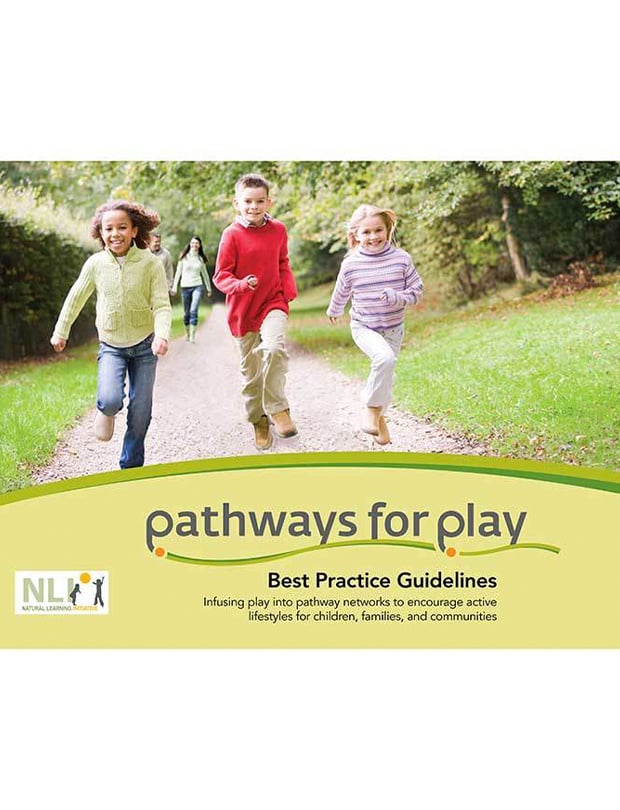
Pathways for Play®
PlayCore has partnered with the Natural Learning Initiative, College of Design, NC State University to offer an educational resource designed to help professional and community activists promote playful trails and greenways across our nation. The partnership also included collaborations with Advisory Committee of experts from American Trails. Pathways for Play intentionally integrates play into community pathway networks to provide opportunities for playing along the way and encourage use by children and families.
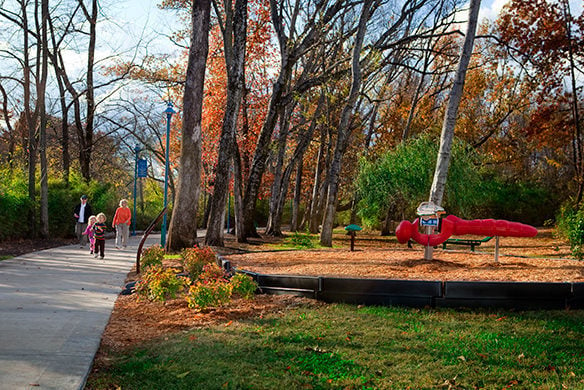 >
>
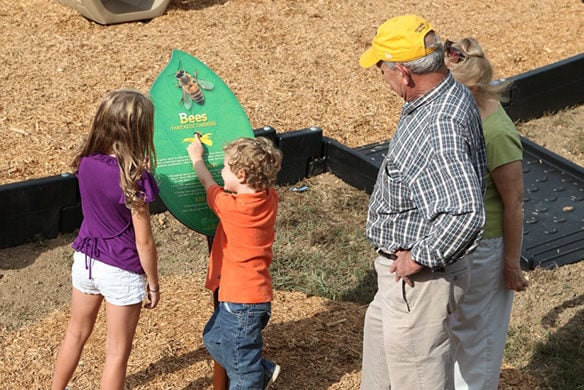 >
>
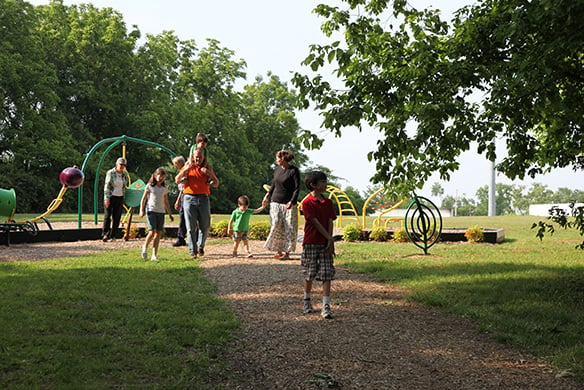 >
>
The Science
In the last 40 years, the number of children and adolescents in the United States walking or bicycling to or from school has dropped from approximately half to fewer than 15%. Innovative pathway designs infused with play is a paradigm change that could increase children's walking and biking habits by offering a network of intriguing linear play environments connecting children's homes to playgrounds and other meaningful, daily life destinations. To create this guidebook, supporting research was gathered on spontaneous play, family interaction in the outdoors, traffic issues, independent mobility, contact with nature, and adult/child interaction. This data was used to develop a set of benefits for playful pathways, supported and implied by the research, including health promotion, inclusion, environmental literacy, connectivity, and social capital. Since this combination of benefits may not be achieved by other means, Pathways for Play creates a new approach in outdoor recreation for the family.
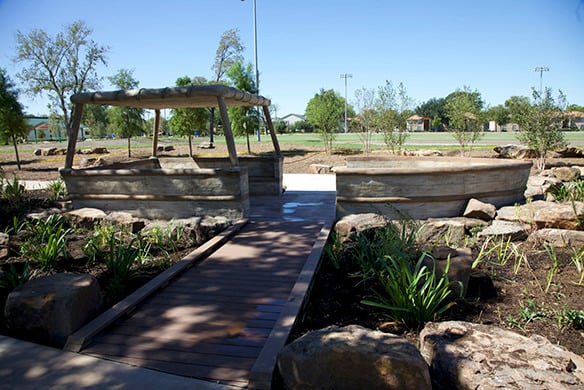 >
>
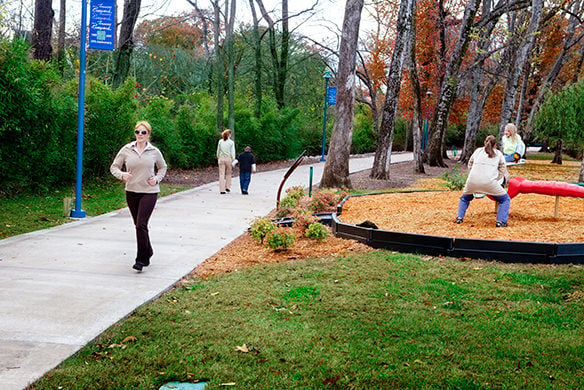 >
>
Why Request Pathways for Play?
This educational resource is designed to help professional and community activists promote playful trails and greenways across our nation by integrating play into walkable, bikeable, shared use community pathway networks infused with "play pockets" providing opportunities for playing along the way. It describes ways to combine historical elements, built play equipment, and natural materials in fun pockets of activity, then space these pockets along a trail, designed with curving paths to disguise the next activity and create an element of mystery and discovery. Playful exhibits stationed along the trail increase the usage of pathways and trails by using familiar behaviors while teaching facts about the environment in a friendly, non-formal way. Pathways designed with us using these best practice guidelines are eligible for National Demonstration Site status.
Contributing Partners

The guide was developed in partnership with The Natural Learning Initiative (NLI), a research and design assistance program of the College of Design of North Carolina State University. Their purpose is to promote the natural environment in the daily experience of all children and families through environmental design, action research, education, and dissemination of information.The partnership also included collaborations with an Advisory Committee of experts from American Trails.
Contributing Scholars

Nilda Cosco, PhD
North Carolina State University Research Professor and Director of Programs; Department of Landscape Architecture and Environmental Planning and Nature Learning Institute
Nilda Cosco, PhD
North Carolina State University Research Professor and Director of Programs; Department of Landscape Architecture and Environmental Planning and Nature Learning InstituteNilda Cosco, PhD, Research Associate Professor and Director of Programs, Natural Learning Initiative NLI, College of Design, NC State University. Dr. Cosco holds a degree in Educational Psychology, Universidad del Salvador, Argentina and a PhD in Landscape Architecture, Edinburgh University, Scotland. In 2000, she cofounded the Natural Learning Initiative at the College of Design, North Carolina with Professor Moore. She developed in 2007 the program Preventing Obesity by Design (POD). Professor Cosco’s research focuses on the impact of outdoor environments on health outcomes such as obesity, sedentary lifestyles, attention functioning, and well-being.
Areas of Discipline
- Impact of Designed Outdoor Environments on Children's Health
- Educational Psychology
- Landscape Architecture
Contributions

Marybeth Lima, PhD
Louisiana State University Chair; Department of Biology and Agricultural Engineering
Marybeth Lima, PhD
Louisiana State University Chair; Department of Biology and Agricultural EngineeringMarybeth Lima, PhD, PE (professional engineer), CPSI (Certified Playground Safety Inspector) is the Cliff & Nancy Spanier Chair in Biological & Agricultural Engineering (BAE) at Louisiana State University (LSU) and the Director of the LSU Center for Community Engagement, Learning, and Leadership (CCELL). In 1998, Marybeth established the LSU Community Playground Project, a service-learning program which pairs elementary school and college students to design and build “dream playgrounds” at local public schools. These sustained efforts have led to the construction of more than 30 collaboratively designed playgrounds; this program is internationally known, and Lima received the Thomas Ehrlich Civically Engaged Faculty Award from Campus Compact (2007), the highest national honor for a service-learning faculty member in any discipline. She has authored or co-authored more than 100 technical publications, including four books. Lima is a Fellow of the American Institute of Medical and Biological Engineering and the American Society for Engineering Education.
Areas of Discipline
- Biological & Agricultural Engineering
Contributions

Robin Moore, Dipl Arch, MCP, ASLA
North Carolina State University Professor Emeritus; College of Design
Robin Moore, Dipl Arch, MCP, ASLA
North Carolina State University Professor Emeritus; College of DesignRobin Moore, Dipl Arch, MCP, ASLA, holds degrees in architecture (London University) and urban planning (MIT), and for most of his career has worked in the field of landscape architecture as an educator, researcher, and consultant. Moore is an international authority on the design of children's play and learning environments, user needs research, and participatory public open space design. He has won many awards for his contributions to the field of design. and is the author or co-author of several books and numerous articles on the use of the outdoor environment by children and families, and their involvement in the planning and design process. He was the principal investigator for the US Access Board update of the Uniform Federal Accessibility Standards for Children's Environments. He is past president of the International Association for the Child's Right to Play (IPA), and for twenty years was editor of the IPA magazine, PlayRights.
Areas of Discipline
- Landscape Architecture & Planning
Contributions

Russell Carson, PhD
Consultant
Russell Carson, PhD
ConsultantRuss has over 25 years of experience as a university Professor in kinesiology and public health, applied school physical activity researcher, and published scholar and passionate speaker on topics of comprehensive health and wellness. Russ is the Founding Director of the University of Northern Colorado Active Schools Institute and has worked passionately with PlayCore’s Data Service Lab, where he helped build cross-functional teams and synergetic partnerships with industry and academic leaders, funders, non-profit organizations, and public and government agencies to advance healthy community outcomes. Russ is currently a collaborative consultant dedicated to empowering professionals with the research and data needed to maximize community impact. Russ lives, works, and plays in northern Colorado.
Areas of Discipline
- Advancing impactful research and data initiatives in community and industry settings
Contributions
Program Request
Fill out the form below to request your copy of Pathways for Play®